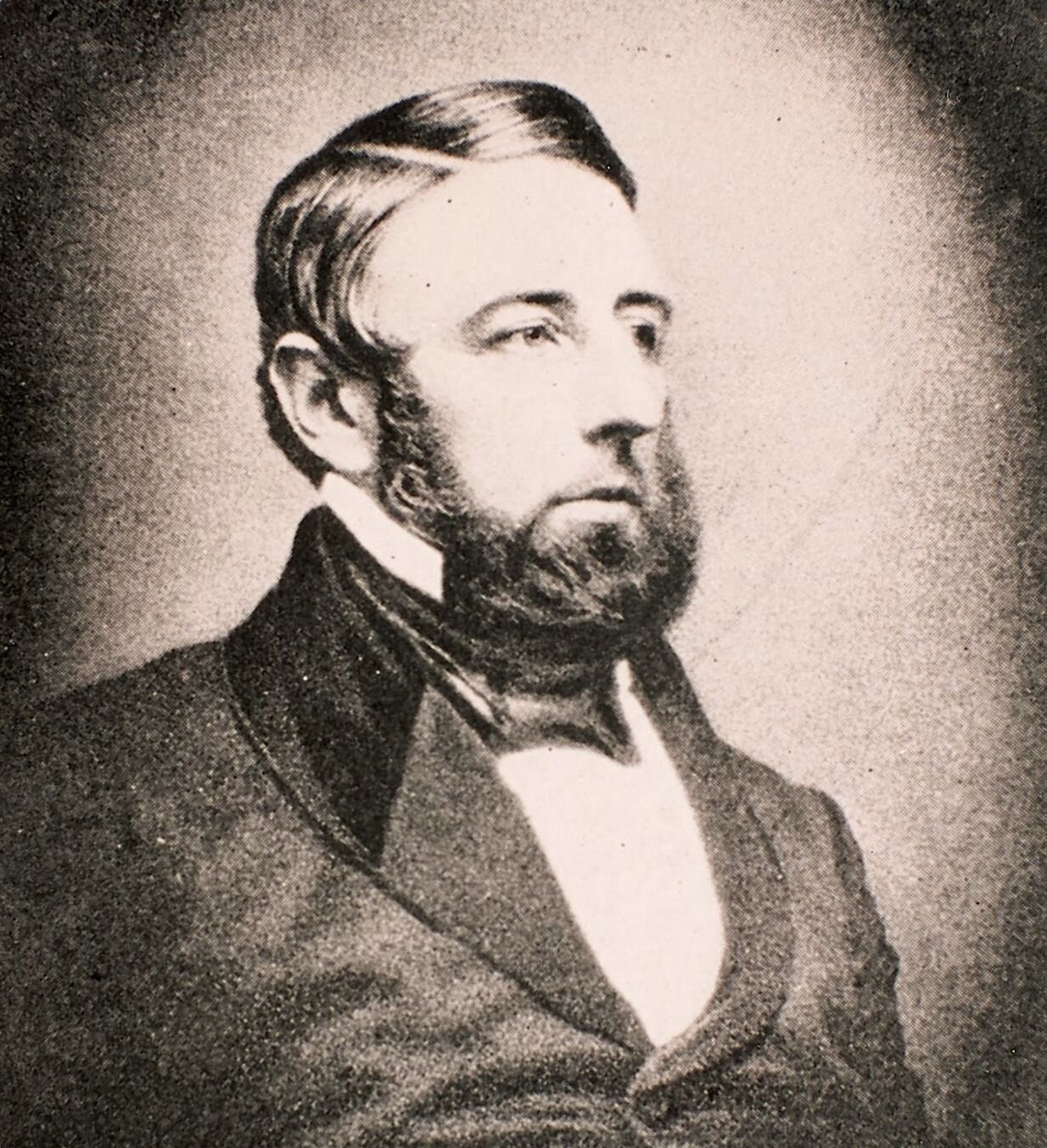Asa Eldridge
Asa Eldridge, perhaps the most famous sea captain that the Cape has produced, was born in Yarmouth on July 25, 1809. The house he lived in remains an ornament to Yarmouth Port, standing at 100 Old Kings Highway. For a number of years he sailed with the Dramatic Line whose ships were each named after a famous actor or playwright; the ships were among the first to stress luxury both as to fittings and as to cuisine, some of them having the first cold store, thus avoiding the necessity of having live cattle and chickens aboard for slaughtering as the occasion arose.
He later served as captain of Cornelius Vanderbilt's 260 foot steam yacht North Star on a cruise of European waters. Captain Eldridge's wife accompanied him on the voyage and the couple were graciously included in all the social occasions.
Booklet written about Vanderbilt’s European cruise with Asa Eldridge as captain, by John Overton Croules
Writer Henry Kittredge recounted an incident illustrating Captain Eldridge's seamanship when a local pilot was taking the North Star through a particularly ticklish stretch of channel and Eldridge, standing on the bridge with Mr. Vanderbilt said, "If that chap doesn't look out, he'll have us aground in a minute." At that moment the ship grounded and had to be hauled off by tugs. Thereafter Vanderbilt made it a habit to consult Captain Eldridge even at times when when the yacht was under control of the pilot.
Eldridge's most famous voyage was on the extreme clipper ship Red Jacket, in which he set a record for passage by sail from New York to Liverpool of thirteen days, one hour and twenty-five minutes which was never bested. His three best days covered 413, 374 and 371 miles, his poorest, 106, 119 and 150 miles. The Red Jacket, modeled by Samuel H. Pook and built at Rockland, Maine by George Thomas, was often considered among the most handsome and beautiful of the American clipper ships.
Clipper Red Jacket
Driving the ship relentlessly every day of her run through the snow, hail and rain for which winter on the North Atlantic is famous, Captain Eldridge, finding the weather off Liverpool thick and squally with no steam tug available and the pilot refusing to take the ship up the river, managed to dock the great ship without the help of tugs. The episode was described as follows:
"[T]he Red Jacket came sweeping into the Mersey under her own sail with every stitch drawing. At exactly the right moment [Captain Eldridge] ... gave the order; her upper sails crumpled, the wind was spilled from her courses, and the Captain shot his great ship into the wind and backed her alongside the dock without so much as a pull from any of the puffing tugs that surrounded her; a maneuver so delicate that not one shipmaster in a hundred would have dared to try it. If anything was needed to add to the fame of Captain Eldridge, this flourish did it. The world was at his feet, and he might choose what command he would."
The ship was welcomed by cheering crowds. The Yarmouth Register recounting the event much later (March 30, 1935) stated that "When news [of the Red Jacket's pending arrival] sped along the Liverpool waterfront, people rushed in thousands to the docks; every point of vantage was black with spectators awaiting the arrival of this incredible racer."
Captain Eldridge's final voyage began on January 25, 1856 when he sailed from Liverpool to New York and Boston as commander of the steamer Pacific. The ship was lost at sea with all hands (45 passengers and 141 crew members). Since there were no survivors the details of the disaster remain unknown but it is thought that the ship may have struck an iceberg as ice was heavy that year. The only clue to the disappearance was a message found in a bottle in the Hebrides five years later that said, "On board the Pacific from Liverpool to N.Y. - Ship going down. Confusion on board - icebergs around us on every side. I know I cannot escape. I write the cause of our loss that friends may not live in suspense. The finder will please get it published. W.M. GRAHAM." Examination of the note by authorities and the discovery that a William Graham was a passenger on the ship lent credence to its authenticity.
Steamship Pacific
John Eldridge, the oldest of the three brothers, commanded the Atlantic packets for years, until taking command of the Young Brander, built in 1853 by Jotham Stetson of Chelsea. Authorities differ on whether the ship was a clipper but that she was in any event a fine one, which any captain might have been proud to command. Later he commanded a Civil War troop ship, the former Collins liner Baltic. It was on the Baltic that he was assigned to pick up General Alfred Terry in a southern harbor, notifying him that the ship would have to sail at nine o'clock the following morning. When that time arrived the General was nowhere to be seen. Eldridge ordered the gangplank removed and was in the act of casting off when Terry suddenly rode up on horseback. "Too late to take your horse! You'll have to jump if you're coming yourself!" Eldridge shouted. Terry, offended by the Captain's manner, persisted in taking his time and the Baltic sailed without him, making it necessary for him to commandeer a tug in which he pursued and later boarded the ship.
Capt. John Eldridge
The story goes that the two later encountered one another in a New York hotel and that Terry cried out, "There's the ruffian that sailed without me!" Approaching Eldridge's table he flourished a sword and said, "I wish I'd taken this sword and slashed you with it!" Eldridge, unruffled, replied "Another word out of you and I'll take that sword away from you and smash it over your head!"
John Eldridge was not a man to be trifled with. Weighing upwards of two hundred pounds, he is described by Kittredge as "having the head and brow of a Gladstone and the physique of a professional wrestler." His voice was said to have carried as far as from the Yarmouth shore to Sandy Neck lighthouse and old salts were known to refer to him as "that old devil that lived over in Yarmouth."
Another story has him tilting an 1800 pound hogshead of tobacco to his thighs and lifting it clear of the ship's deck and, on another occasion, up-ending a hogshead of molasses with two fingers. Still another has him confronted by striking stevedores at Mobile, Alabama and, when one of them refused to move out of his way, grabbing the man by the scruff of his neck and the seat of his trousers, slinging him over his shoulder like a sack of meal and carrying him to the police station.
Interestingly, this formidable man, retiring from the sea after the Civil War to spend his remaining days in Yarmouth Port, became known as a genial host for cultural events, such as musicales and literary meetings at his house, the present day Village Inn. He died in 1874 at the age of seventy-five, the only one of the three brothers to pass away in his native town. His home later became the Eldridge Hall School for Young Ladies.
Oliver Eldridge, the last of the three brothers, served as mate under his brother John on the Liverpool of the Swallow Tail line and eventually became a formidable captain in his own right. In 1844 he was given command of the clipper ship Coquette, owned by Russell and Company and built by Samuel Hall in East Boston. He sailed her from Boston to Canton in ninety-nine days. New clipper ships often had him as their first command. In 1848 he commanded Memnon, owned by Warren Delano, on her maiden voyage to China and in 1855 he commanded the Titan, built by Roosevelt and Joyce in New York.
Capt. Oliver Eldridge
After the latter vessel was chartered by the French government as a troop and munitions transport during the Crimean War, Oliver took command of the old Collins liner Atlantic which was used as a transport during the American Civil War. The Atlantic had a drawing room and a separate dining room, lined with mirrors, paneled in expensive wood and richly furnished. Even more innovative, there were bathrooms, a barber shop and the first ever smoking room - actually a cramped little deckhouse, but a hint of grander things to come. The public rooms were steam heated and the ice room held forty tons of ice, enough to keep food fresh for the duration of the voyage. But the staterooms remained small, cramped and double occupancy.
Oliver also ferried Union troops to Virginia and later he delivered steamships around the Horn to San Francisco. After the war, he took on new challenges, including serving as president of two gas companies and the Sunset Telephone Company, as well as the director of Wells Fargo. He was also a member of the Associated Charities of San Francisco. After retiring from the sea he remained in San Francisco and died there in 1902.
Researched and written by William H. Painter
To learn more about Asa, and his brothers, be sure to read the book The Lost Hero of Cape Cod : Captain Asa Eldridge by our own Vin Miles. Copies are available at our office or in bookstores.







